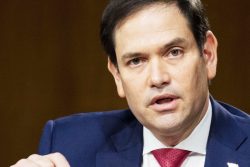Twenty-eight-year-old Alexandria Ocasio-Cortez’s win at the Democratic Primary of the US midterm elections, which held shock value for many Americans, more so New Yorkers, who had never even heard her name before that date, is possibly part of a change occurring in world politics. Although Ms Ocasio-Cortez is far from the world stage at this point—she still has to face the Republican candidate in the general election in November to even enter the US Congress—she is of the ilk of a number of youthful faces leading governments and in the public eye.
Men and women born between the late 70s and early 90s—as opposed to being between the ages of 70 and 90 years old—are no longer waiting to walk in dead men’s shoes and are taking their rightful places as leaders in what is a largely youthful world. They are not as many as there could be considering that more than half of the world’s population is under 30 years old. And by contrast, the majority of world leaders are over 65 years old when only 8.5 percent of the world’s population is over 65. As in almost everything else in the world there is a lack of balance, a disparity. But this can be corrected, and young people are beginning to realise that it can no longer be about their parents’ politics.
Evidence of this has appeared in the October 2017 election of Jacinda Ardern as the 40th Prime Minister of New Zealand. Almost nine months later, on June 21 this year, Ms Ardern gave birth to a baby girl becoming the second world leader to have a child while in office. Pakistani Prime Minister Benazir Bhutto was the first, nearly 30 years ago, but she and Ms Ardern could not be more different. Ms Bhutto was married and the mother of an infant son when she was elected as the first woman Prime Minister of the Muslim country. She had her second and third children while in office and was convicted of corruption in 1999, while in exile. Granted amnesty in 2007, she was assassinated in December that year at a rally, 3 months after her return to Pakistan.
Ms Ardern is unmarried, but lives with television presenter Clarke Gayford, who will care for their child at the end of the Prime Minister’s 6 weeks’ maternity leave. Ms Ardern showed her open support for gay rights when she marched in New Zealand’s pride parade earlier this year. She is also against the criminalisation of abortion and cannabis. In short, she is the kind of role model millennials look to and one whose life to date would earn #goals from them on social media platforms.
One thing that is interesting to note here is that Ms Arden describes herself as a social democrat–someone who supports economic and social interventions to promote social justice—while Ms Ocasio-Cortez describes herself as a democratic socialist. Speaking on the Stephen Colbert show just days after her triumph, she explained it thus: “In a modern, moral and wealthy society, no person in America should be too poor to live… [there should be] health care as a human right, every child… should have access to a college or trade school education…”
In another example, halfway around the world from New Zealand, writer and politician, 38-year-old Carlos Alvarado Quesada was elected as the 48th President of Costa Rica in April this year. Mr Alvarado Quesada, who defeated Fabricio Alvarado Munoz with a 61 percent majority, was a former minister of Labour and Social Security. He is known for having promoted the implementation of laws that cut luxury pensions, and for his ministry’s defence of those laws before Costa Rica’s Constitutional Court after appeals were made. He is not the youngest Costa Rican president, however, that title belonged to Alfredo Gonzalez Flores, who attained the presidency in May 1914, but was ousted in a coup d’etat in January 1917.
Swing back around the world again to Ireland and you will find 39-year-old Leo Eric Varadkar, a medical doctor born to an Indian (Hindu) immigrant father and an Irish mother, Ashok and Miriam Varadkar, serving as Taoiseach (Prime Minister of the Republic of Ireland). Mr Varadkar, who was elected in June 2017, when he was 38 years old is not the youngest ever Irish head of government, but he is the first openly gay one. Mr Varadkar, who spoke openly on the subject for the first time in 2015, has lived with his partner Matthew Barrett, also a doctor since then. In January this year, Mr Varadkar, who served as Minister of Health between 2014 and 2016, announced the referendum, which in May, successfully overturned Ireland’s abortion ban.
In addition to these, while some of their political views might differ and some were elected while others were appointed, the leaders of Georgia, Estonia, Qatar, Bhutan, Austria and San Marino are all under 40.
Prime Minister of Ethiopia Abiy Ahmed, who was appointed to the post in April this year and has since introduced radical programmes of political and economic reforms, is 41 years old.
Better known and just a little older are the President of France Emmanuel Macron, who is 40 years old and Canadian Prime Minister Justin Trudeau, who is 46 years old. Mexico’s Enrique Peña Nieto, who was 45 years old when he won the presidency in 2012, would have been in this group but he has just been replaced by 64-year-old Andrés Manuel López Obrador in an election.
Nevertheless, trends are pointing to younger people using the polls to see persons from their demographic as their leaders. In a world where less than a decade ago young people were viewed as apathetic and accused of squandering hard-fought-for democratic rights, a reawakening is occurring. Now not all youthful leaders are likely to be able to keep their noses clean, examples of that not being the case are all around us, including right here at home. But with our youth becoming increasingly #woke, seeing the avarice behind the honeyed words should not be a problem.









